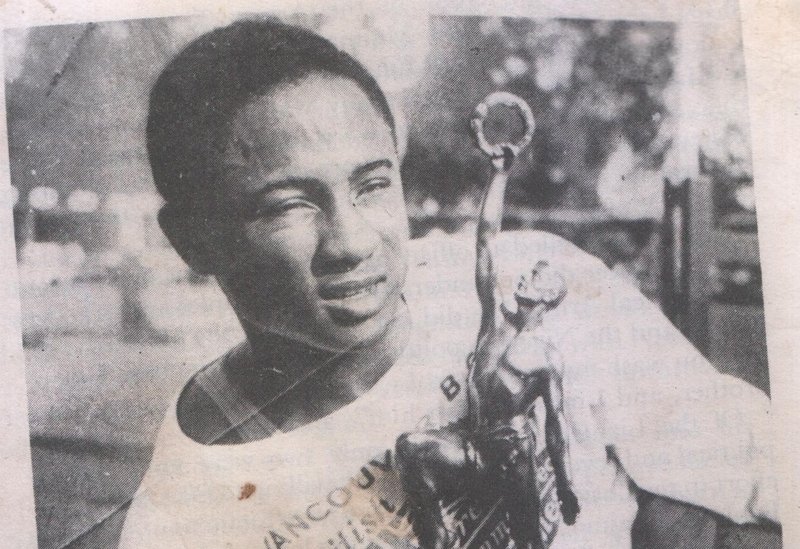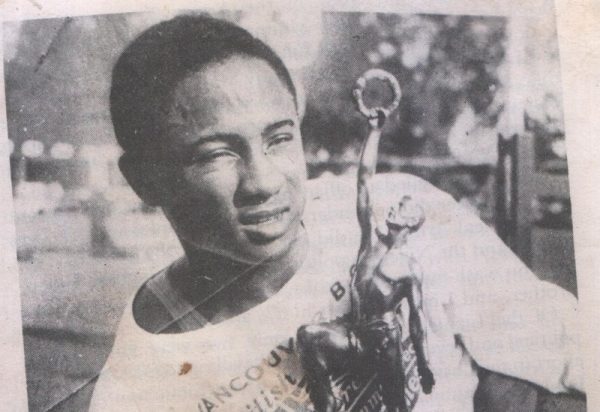Nigeria made her debut appearance in a first ever international competition while still a colonial list territory at the 1950 Commonwealth Games in Auckland, New Zealand. At the time, the games were referred to as the British Empire Games.
Since 1950, Nigeria has been at thirteen Common Wealth competitions and have received a total of 212 medals; 61 gold, 66 silver and 85 bronze medals.
The first medal the country ever won was by Josiah Majekodunmi who competed in the men’s High Jump at the 1950 Empire games in New Zealand.
Majekodunmi won a joint silver medal with Scotland’s Alan Peterson after successfully clearing a height of 1.95m.
1954 British Empire and Commonwealth Games
Four years later, Nigeria made a second appearance at the same competition which was now known as the British Empire and Commonwealth Games, where a Nigerian made African history.
The games, which was held in Vancouver, saw Nigeria become the first African country to produce a gold medalist at the competition.
Nigeria’s Emmanuel Ifeajuna became Africa’s hero when he won gold in the men’s high jump with a then record of 2.03m, despite reports that he may have competed with only his left shoe on.
For Nigeria and Africa, this was a moment where we showed the world that not just good things, but the very best ones can come out of Africa.
Nigeria returned with a total of seven medals; 1 gold, 3 silver and 3 bronze medals.
1958 British Empire and Commonwealth Games
After 1954, the world would have thought Nigeria had a lot more to offer in athletics, but the 1958 games took a rather demeaning turn for Nigeria with only two medals to show for our visit to the games held in Cardiff.
Jimmy Omagbemi, Smart Akrara, Thomas Obi and Victor Odofin gave Nigeria her only silver medal in the competition in a 4×110 yards relay. While Nigerian boxer Gbadegesin Salawu brought him a bronze medal from the boxing event.
1966 British Empire and Commonwealth Games
Nigerian athletes missed the 1962 games, but were in good shape to make it to the 1966 British Empire and Commonwealth Games held in Kingston, Jamaica where Nigeria returned to the glory days with a total of 10 medals after the competition.
3 golds, 4 silvers and 3 bronze medals put Nigeria in tenth place on the medals rank table, with two golds medals won in the boxing event by Edward Ndukwu in Bantamweight and Anthony Andeh in lightweight boxing. While the final gold medal was won by Samuel Igun in the men’s Tripple Jump.
Samuel Igun also won Nigeria a silver medal in the men’s High Jump.
1970 British Empire and Commonwealth Games
Nigeria’s performance in this year was dismal and uninspiring with only two gold medals won at the end of the competition held in Edinburgh, Scotland.
1974 British Commonwealth Games
In 1974, the competition had come to be known as the British Common Wealth Games and Nigeria’s performance at this time was one of redemption rather than ‘pull a world stunner’ with a total of 10 medals at the end of the games which held at the Queen Elizabeth II Park in Christchurch, New Zealand.
In this year, Nigeria had her first gold in the women’s category via Modupe Oshikoya with a record of 6.46m in Long Jump.
Modupe also made silver in the Women’s Pentathlon event, she added a bronze medal to her collection in the Women’s 100m hurdles.
1982 Commonwealth Games
The 1982 Commonwealth games was held in Brisbane, Queensland, Australia with 46 common wealth nations and territories duly represented.
It was in this year that Nigeria began the climb on the medals table with a total of 13 medals.
Nigeria could win no silver medals in the competition, but received 8 bronze and a then record breaking 5 gold medals at the competition.
Three Nigerians, Joe Orewa, Peter Konyegwachie and Christopher Ossai usurped the most gold by any country in the boxing event. Three bronze medals were also awarded to Nigeria from the same event.
In Nigeria’s first ever at the time, Oliver Orok won gold in the men’s Sub Heavyweight-overall Weightlifting event. In the same event four other Nigerians won bronze medals in different categories.
Nigeria picked her 8th bronze medal from the Wrestling event thanks to Augustine Atasie.
Nigeria’s fifth gold medal was won by Lawrence Adegbehingbe, Iziaq Adeyanju, Samson Oyelodun and Ikoto Eseme in the men’s 4x100m relay with a total time of 39.15s
1990 Commonwealth Games
The 1990 Commonwealth games which held in Auckland was not too different from Nigeria’s previous appearance at the games, save that the Nigerian team added 13 more silver medals to its collection.
The team won a total of 25 medals, 5 gold, 13 silver and 7 bronze medals at the 1990 edition of the games.
1994 Common Wealth Games
At the 1994 Commonwealth games held in Victoria, Canada, Nigeria went even farther to reach an all-time high medal haul record.
It was in this year that Nigerian athletes in track and field clinched their highest medals ever at the time.
The Nigerian team won 3 gold medals in women’s 100m, men’s long jump and women’s 4x400m relay respectively; four silver and four bronze medals.
Nigeria won an unsurpassed record 37 medals at the 1994 edition of the games.
Legend Mary Onyali was Nigeria’s standout athlete at the games when she ran for gold with an impressive time (11.06s) in the women’s 100m race.
Charity Opara-Thompson followed in 11.22s to claim the silver medal in the event.
Onyali also made silver in the women’s 200m where she finished 0.10s behind gold medalist Cathy Freeman.
Onyali was also the star athlete in Nigeria’s gold-run in the 4x100m relay race as she made the first run for the team which comprised of the quartet including Faith Idehen, Mary Tombiri and Opara-Thompson.
In the men’s long jump, Obinna Eregbu leapt for gold to a distance of 8.05m ahead ofAustralia’s David Culbert (8.00m) and Ian James of Canada (7.93m).
Till today no Nigerian team at the Common Wealth games has been able to replicated the performance of the 1994 Nigerian team in medals collected.
2002 Commonwealth Games
The 2002 Commonwealth Games held in Manchester, England saw Nigeria perform relatively low compared to her previous visit to the games in Victoria.
The Nigerian team was only able to make 5 gold, 3 silver and 11 bronze medals.
Despite the dismal overall performance of the Nigerian team, there was a rather bright star in the midst of the lusterless night.
Adekunle Adesoji ran for gold in the men’s 100m EAD (Elite Athletes with a Disability) category where he clinched a world record time of 10.76s to finish ahead of Malaysia’s Hisham Khaironi (11.53s) and South Africa’s Rory Field (11.96s).
2006 Commonwealth Games
The 2006 Commonwealth Games who was officially known as the 18th Commonwealth Games was a multi sport event held in Melbourne, Victoria, Australia.
The performance of a huge number of countries present at the games was quite poor so Nigeria’s low performance was not too much of a worry to fans and the Athletes federation.
Nigerian won a total of 17 medals; 4 gold, 6 silver and 7 bronze medals at the games.
2010 Common Wealth Games
In the 2010 Commonwealth Games held in Delhi, India, the Nigerian team at the Olympics resumed resumed its winning ways with a total of 33 medals; 11 gold, 8 silver and 14 bronze medals.
2014 Commonwealth Games
In the 2014 edition of the Commonwealth Games held in Glasgow, Scotland, 71 commonwealth nations were in attendance and 261 medal events were held in 18 sports.
Nigeria bided against Scotland for the rights to host the event, but Scotland pulled in 23 more votes than Nigeria and were given the rights to host the event.
At the end of the 2014 edition, Nigeria came one medal short of her 1994 glory in Victoria, Canada.
Nigeria had her first gold in day 4 of the competition via Olauwatoyin Adesanmi in the Women’s 63kg Weightlifting event.
On Day 5, Mary Okagbare doubled Nigeria’s gold when she made a record time in the women’s 100m event on day 5 of the games.
The next time the Nigerian team saw any more gold medals was in Day 7 of the event via Maryann Usman, Odunayo Adekuoroye and Aminat Adeniyi in the Women’s +75 kg weightlifting, women’s freestyle 53kg and Women’s freestyle 57kg wrestling events respectively.
On Day 8, See Brume won another gold medal for Nigeria in Women’s long jump while Blessing Okagbare clinched her second gold medal in the competition in the women’s 200m race.
On Day 10 of the competition, the ladies added two more gold medals to Nigeria’s collection in the women’s +61kg powerlifting event. Two male athletes also won gold for Nigeria in the male +72kg category same event.
2018 Commonwealth Games
The 2018 Commonwealth Games tagged Gold Coast 2018, which held in Gold Coast, Australia, saw Nigeria present 88 competitors in 8 sports.
Nigeria’s 100m and 200m champion Blessing Okagbare opened the event as Nigeria’s flag bearer and at the end of the games, Nigeria had a total of 9 GOLD, 9 SILVER and 6 BRONZE medals, bringing her total meal haul at the Commonwealth Games to 236 so far (70 GOLD, 75 SILVER and 91 BRONZE medals).
Compared to the 2014 Commonwealth Games, Nigeria’s performance at this year’s games was very poor and almost nothing to write home about as fans everywhere had hoped the country would surpass the performance at 1994 Victoria Commonwealth Games (which is her best yet).
See the sports section for more info on the 2018 Commonwealth Games.


